Robbie Robertson, The Band's Songwriter and Primary Guitarist, Dead at 80
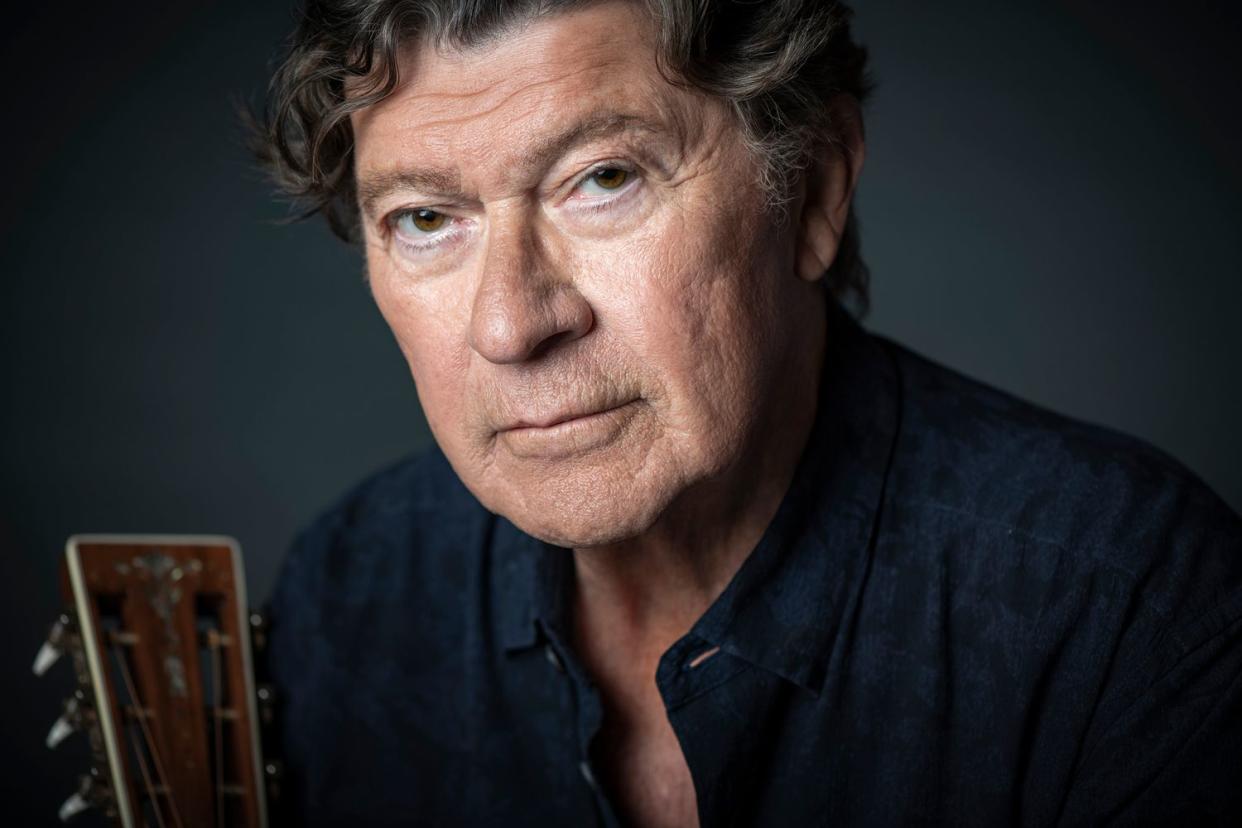
- Oops!Something went wrong.Please try again later.
- Oops!Something went wrong.Please try again later.
- Oops!Something went wrong.Please try again later.
- Oops!Something went wrong.Please try again later.
"Robbie was surrounded by his family at the time of his death," his longtime manager Jared Levine wrote

Don Dixon
Robbie RobertsonRobbie Robertson, one of rock's greatest storytellers and The Band's guitarist and primary songwriter, died Wednesday at age 80.
The musician, who famously penned the group's classics including “The Weight,” “The Night They Drove Ol’ Dixie Down" and “Up on Cripple Creek," died in Los Angeles "after a long illness," according to a press release.
Robertson's death was confirmed by Jared Levine, his manager of 34 years.
“Robbie was surrounded by his family at the time of his death, including his wife, Janet, his ex-wife, Dominique, her partner Nicholas, and his children Alexandra, Sebastian, Delphine, and Delphine’s partner Kenny,” Levine said in a statement. “In lieu of flowers, the family has asked that donations be made to the Six Nations of the Grand River to support the building of their new cultural center."
Related: Robbie Robertson Chronicles the End of the Band in Bittersweet New Song 'Once Were Brothers'
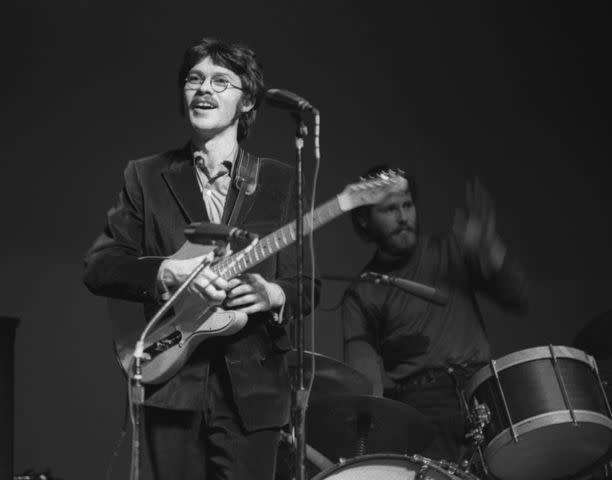
Harvey L. Silver/Corbis via Getty
Robbie Robertson and drummer Levon Helm of The Band perform during a concert at Queens College in New YorkBorn Jamie Royal Robertson in Toronto in 1943, the legendary songwriter had roots in the Mohawk community at the Six Nations Reserve and the Jewish enclave of the city’s downtown. He began playing guitar at the age of 10, and in 1960 at the age of 16, he joined drummer Levon Helm in the Hawks, the backing band for rockabilly musician Ronnie Hawkins. The Hawks lineup eventually include future members of The Band Rick Danko, Richard Manuel, and Garth Hudson.
In 1965 and 1956, The Hawks joined Bob Dylan on his legendary “Going Electric” tours. Relocating to Woodstock in 1967, Robertson and his bandmates recorded their hallmark “basement tapes” with Dylan before becoming The Band and releasing their seminal album Music from Big Pink in 1968, which featured the Robertson-composed classic "The Weight."
Just one year later, The Band shared their eponymous album, which featured Robertson-penned classics “Up on Cripple Creek” and “The Night They Drove Old Dixie Down.”
The Band released albums annually the next several years with Stage Fright (1970), Cahoots (1971) with “Life Is a Carnival,” and the double live set Rock Of Ages (1972). In 1973, the rock group famously performed before the largest rock concert audience in history (an estimated 650,000 people) at the Watkins Glen Festival in New York.
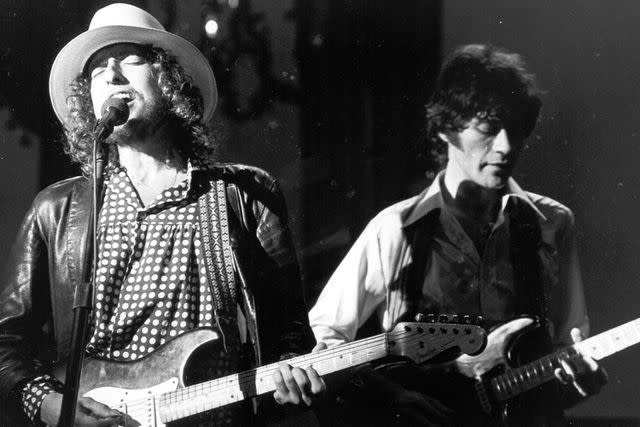
Larry Hulst/Michael Ochs Archives/Getty
Bob Dylan and Robbie Robertson in 1976
After backing Dylan on Planet Waves, The Band released their record Moondog Matinee in 1974 and backed Dylan on his reunion tour and led to the collaboration Before The Flood. The following year, The Band released their 1975 album Northern Lights - Southern Cross.
By 1976, The Band said goodbye live performances, but not before wrapping it up with “The Last Waltz” concert in San Francisco on Thanksgiving night featuring guests like Dylan, Eric Clapton, Muddy Waters, Van Morrison, Neil Young and Joni Mitchell. Two years later, a concert film, directed by Martin Scorsese, and a three-record box set, were released.
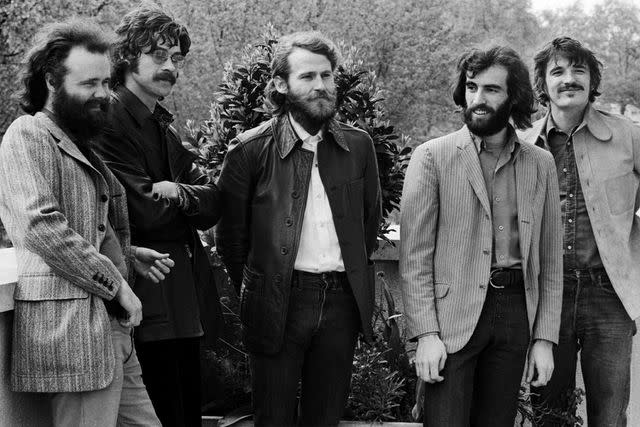
Gijsbert Hanekroot/Redferns
From left: Garth Hudson, Robbie Robertson, Levon Helm, Richard Manuel and Rick Danko of The Band.
The Band’s seventh and final studio album with Robertson — Islands — was shared in 1977. Robertson went onto produce Neil Diamond's Love at the Greek live album after working on Diamond’s Beautiful Noise the year prior.
The Band musician's fascination with film evolved into a significant part of his career, co-writing, producing, appeared in and composing the source music for Carny (1979). He also created and produced music for Scorsese’s Raging Bull (1980), King of Comedy (1983), and The Color Of Money (1986), which included “It’s In The Way That You Use It,” co-written with Clapton. Robertson also served as a creative consultant on Taylor Hackford’s ode to Chuck Berry, Hail, Hail Rock & Roll.
In 1987, Robertson released his Grammy-nominated, self-titled solo album debut, which featured guests Peter Gabriel and U2 and the track “Somewhere Down the Crazy River.” Robertson ended up reuniting with The Band for an awards ceremony performance when they were inducted into the Juno Hall of Fame.
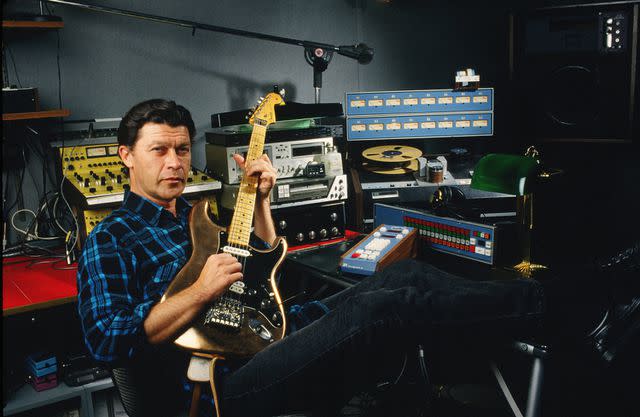
George Rose/Getty
Robbie Robertson in his recording studio during a 1987 Santa MonicaFour years later, Robertson shared his sophomore LP Storyville (1991), while his track “Broken Arrow” became a major hit for Rod Stewart.
In 1994, The Band reunited again when they were inducted into the Rock and Roll Hall of Fame and performed live at the ceremony. That year, Robertson also paid homage to his Native American heritage with an album called Music for The Native Americans — written by Robertson and other colleagues billed as the "Red Road Ensemble" for the TV documentary film The Native Americans.
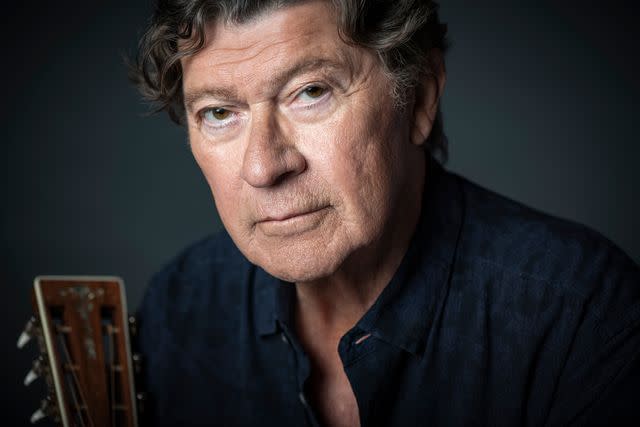
Don Dixon
Robbie RobertsonRobertson continued his film scoring career with Barry Levinson’s Jimmy Hollywood and acted in the Sean Penn-directed The Crossing Guard. He also produced the soundtrack album for Scorsese’s Casino in 1995 and was the subject of Going Home, a Disney Channel documentary that revisited his life and career. As the executive soundtrack producer of Phenomenon, Robertson sent a demo of "Change The World" to Clapton and enlisted Babyface to produce the track. He later received a Lifetime Achievement Award from the National Academy of Songwriters.
Robertson released his fourth solo album in 1998 with the Grammy-nominated Contact from the Underworld of Redboy. Inspired the PBS documentary Robbie Robertson: Making a Noise, it chronicled his journey back to the Six Nations Reservation, where his mother was born and raised and where Robertson first learned to play guitar.
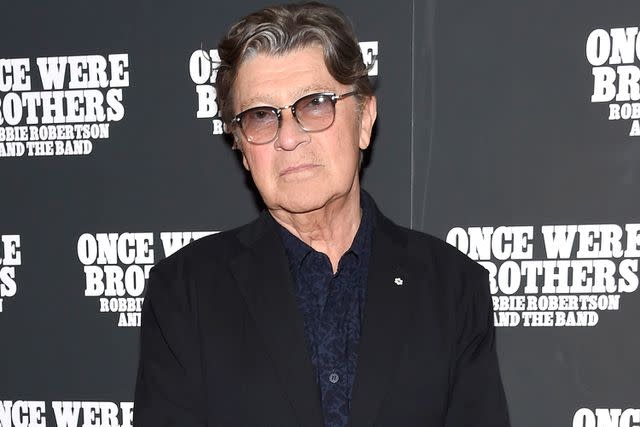
Gary Gershoff/Getty
Robbie Robertson at Walter Reade Theater in New York City in February 2020Additionally, Robertson has scored, consulted for, produced or supervised music for films including American Beauty (1999), Any Given Sunday (1999) Gangs of New York (2002), The Departed (2006), Shutter Island (2009), The Wolf of Wall Street (2013), and Silence (2016).
Along the way, The Band earned a Lifetime Achievement Grammy Award and Robertson won several Juno Awards in his native Canada. Additionally, he was honored twice by Canada’s Walk of Fame, inducted into the Canadian Songwriters’ Hall of Fame, made an Officer of the Order of Canada, and received the Governor General’s Performing Arts Award.
Robertson teamed up with Clapton again for a large portion of his fifth solo album, 2011’s How to Become Clairvoyant, along with Steve Winwood, Rage Against the Machine's Tom Morello, and Nine Inch Nails' Trent Reznor.
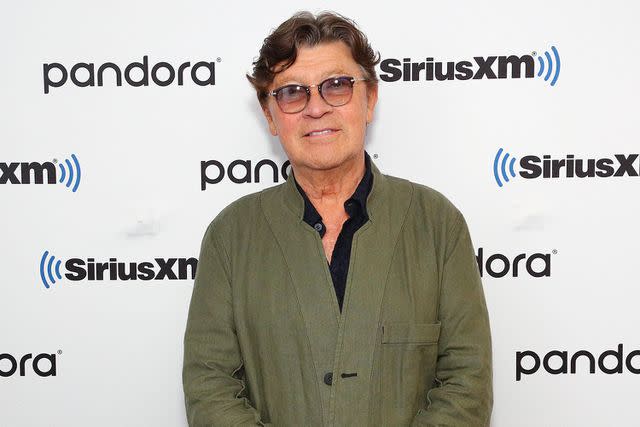
Astrid Stawiarz/Getty
Robbie Robertson in 2019He released his memoir, Testimony in 2016, and a documentary film based on the book titled Once Were Brothers: Robbie Robertson and The Band, which premiered at 2019’s Toronto International Film Festival.
Three years later, the "Somewhere Down the Crazy River" musician shared his sixth solo studio album Sinematic. He also reunited with Scorsese on his original score for The Irishman.
"Robbie Robertson was one of my closest friends, a constant in my life and my work. I could always go to him as a confidante. A collaborator. An advisor. I tried to be the same for him," Scorsese said in a statement.
"Long before we ever met, his music played a central role in my life—me and millions and millions of other people all over this world. The Band’s music, and Robbie’s own later solo music, seemed to come from the deepest place at the heart of this continent, its traditions and tragedies and joys. It goes without saying that he was a giant, that his effect on the art form was profound and lasting. There’s never enough time with anyone you love. And I loved Robbie."
When Robertson died, he was in the process of penning his follow-up memoir to Testimony, and had just finished scoring Scorsese’s Killers of The Flower Moon starring Leonardo DiCaprio and Robert DeNiro. The film is due Oct 6.
For more People news, make sure to sign up for our newsletter!
Read the original article on People.

